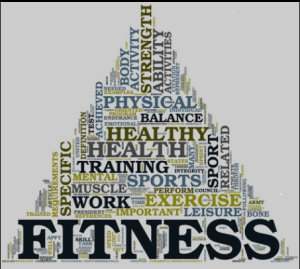Health and Fitness
- Introduction to Health and Fitness
- Importance of maintaining good health
- The relationship between health and fitness
- Benefits of Regular Exercise
- Physical benefits
- Mental benefits
- Components of Fitness
- Cardiovascular endurance
- Muscular strength
- Flexibility
- Body composition
- Types of Exercise
- Aerobic exercise
- Strength training
- Flexibility exercises

- Importance of Proper Nutrition
- Balanced diet
- Hydration
- Tips for Maintaining Health and Fitness
- Set realistic goals
- Stay consistent
- Listen to your body
- Incorporate variety into your routine
- Overcoming Common Barriers to Exercise
- Lack of time
- Motivation
- Injury prevention
- Mental Health and Fitness
- The connection between exercise and mental well-being
- Stress management techniques
- Incorporating Fitness into Daily Life
- Active commuting
- Workplace wellness initiatives
- Family activities
- Seeking Professional Guidance
- Personal trainers
- Nutritionists
- Monitoring Progress
- Tracking tools and apps
- Celebrating achievements
- Addressing Health Conditions
- Exercise considerations for chronic illnesses
- Working with healthcare professionals
- Staying Motivated
- Finding inspiration
- Joining a community
- Creating a Sustainable Routine
- Balancing rest and activity
- Adapting to lifestyle changes
- Conclusion
- Summary of key points
- Encouragement for embracing a healthy lifestyle
Health and Fitness
In today’s fast-paced world, where demands on our time and energy are constantly increasing, maintaining good health and fitness is more important than ever. Our physical and mental well-being are closely intertwined, and making conscious efforts to prioritize them can significantly improve our quality of life.
Importance of Maintaining Good Health
Good health is not merely the absence of illness but encompasses a state of physical, mental, and social well-being. It enables us to lead fulfilling lives, pursue our goals, and enjoy meaningful relationships. Without good health, even the simplest tasks can become challenging, affecting every aspect of our lives.
Benefits of Regular Exercise
Regular exercise is one of the cornerstones of good health. It offers a myriad of benefits, both physical and mental. Physically, exercise helps improve cardiovascular health, build strength and endurance, and maintain a healthy weight. Mentally, it reduces stress, anxiety, and depression, while boosting mood and cognitive function.
Components of Fitness
To understand the importance of exercise, it’s essential to recognize the components of fitness:
- Cardiovascular endurance: The ability of the heart and lungs to supply oxygen to the muscles during prolonged physical activity.
- Muscular strength: The maximum force a muscle or group of muscles can exert against resistance.
- Flexibility: The range of motion around a joint.
- Body composition: The proportion of fat, muscle, and other tissues in the body.
Each of these components plays a crucial role in overall fitness and should be addressed in a well-rounded exercise routine.
Types of Exercise
There are various types of exercise that target different aspects of fitness:
- Aerobic exercise: Activities such as walking, running, swimming, and cycling that increase heart rate and improve cardiovascular health.
- Strength training: Exercises using weights or resistance bands to build muscle strength and endurance.
- Flexibility exercises: Stretching and mobility exercises that improve range of motion and reduce the risk of injury.
Incorporating a combination of these exercises into your routine ensures comprehensive fitness development.
Importance of Proper Nutrition
Exercise alone is not enough to achieve optimal health and fitness. Proper nutrition is equally important. A balanced diet that provides essential nutrients, vitamins, and minerals is essential for supporting exercise performance, recovery, and overall well-being. Additionally, staying hydrated is crucial for maintaining bodily functions and preventing dehydration during exercise.
Tips for Maintaining Health and Fitness
Achieving and maintaining health and fitness requires commitment and dedication. Here are some tips to help you stay on track:
- Set realistic goals: Establish achievable targets that align with your abilities and aspirations.
- Stay consistent: Incorporate exercise and healthy eating habits into your daily routine.
- Listen to your body: Pay attention to signs of fatigue, pain, or discomfort, and adjust your workouts accordingly.
- Incorporate variety: Keep your routine interesting by trying different types of exercises and activities.
Overcoming Common Barriers to Exercise
Despite the numerous benefits of exercise, many people encounter barriers that prevent them from being active:
- Lack of time: Busy schedules often make it challenging to find time for exercise.
- Motivation: Maintaining motivation can be difficult, especially when faced with obstacles or setbacks.
- Injury prevention: Fear of injury or past injuries may deter individuals from engaging in physical activity.
By addressing these barriers proactively and finding strategies to overcome them, you can establish a sustainable exercise routine.
Mental Health and Fitness
In addition to its physical benefits, exercise plays a vital role in mental health. Regular physical activity has been shown to reduce symptoms of stress, anxiety, and depression, while promoting feelings of relaxation and well-being. Incorporating stress management techniques such as mindfulness meditation or yoga can further enhance mental resilience.
Incorporating Fitness into Daily Life
Finding time for exercise doesn’t always require a trip to the gym. Incorporating fitness into daily activities can be both convenient and enjoyable:
- Active commuting: Walking or cycling to work or running errands can add physical activity to your day.
- Workplace wellness initiatives: Taking advantage of workplace fitness programs or organizing group activities with colleagues can promote a healthy lifestyle.
- Family activities: Engaging in outdoor activities or sports with family members encourages bonding while staying active.
Seeking Professional Guidance
For those seeking personalized guidance or support, professional resources are available:
- Personal trainers: Working with a certified personal trainer can help tailor a fitness plan to your specific needs and goals.
- Nutritionists: Consulting with a nutritionist or dietitian can provide valuable guidance on meal planning and dietary strategies to support your fitness goals.
Monitoring Progress
Tracking your progress is essential for maintaining motivation and making adjustments to your fitness routine:
- Tracking tools and apps: Utilize fitness apps or wearable devices to monitor your activity levels, track workouts, and set goals.
- Celebrating achievements: Recognize and celebrate milestones along your fitness journey to stay motivated and inspired.
Addressing Health Conditions
For individuals with existing health conditions, it’s essential to exercise safely and consider any limitations:
- Exercise considerations for chronic illnesses: Work with healthcare professionals to develop an exercise plan that accommodates any medical concerns or limitations.
- Working with healthcare professionals: Consult with your doctor or physical therapist before starting a new exercise program, especially if you have underlying health issues.
Staying Motivated
Maintaining long-term health and fitness requires ongoing motivation:






